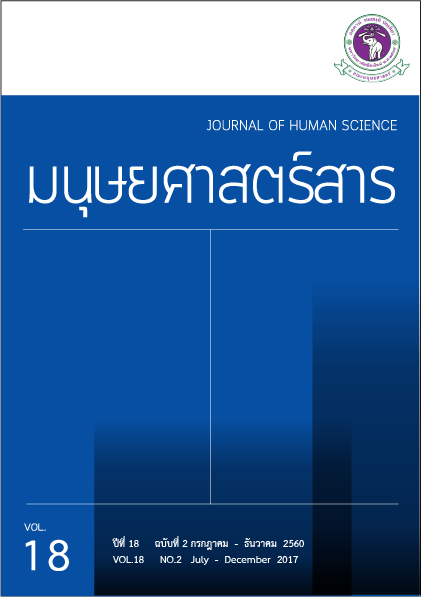Writer’s Social Engagement in the online space A Case study of Win Lyovarin’s facebook fan page narrative language uses
Main Article Content
Abstract
This article aims to analyze the contents and narrative language uses produced by Win Lyovarin in his facebook fan page in 4 months ranging from October 2016-January 2017 total 356 stories by adapting the concept of narrative components, writing techniques, literature and society, and web 2.0 as research methodology. The study found that there are two reasons causing Win Lyovarin accomplish his writer’s mission. Firstly, the content of online narratives are corresponding well to online readers’ interest. In particular the stories about individuals that are life goal planning, positive attitudes and self-esteem as well as the stories of King Bhumibhol which highly influenced on Thai people emotions. Secondly, narrative language uses are suitable for online readers’ behavior. These include reading short messages with strikingly influenced on feelings and aroused thoughts. To measure this success this study uses numbers of ‘like’ pressing and comments as an indicator.
The online narratives of Win Lyovarin are composed of short messages not over 100 words, medium messages ranging between 101-400 words, and long messages over than 401 words. These narratives aim to guide readers how to live in a modern society and highlight Thai society problems in many aspects which could be ordered from rate of recurrence as follows; (1) guiding
(2) narrating (3) knowledge propagating (4) criticizing or expressing ideas
(5) advertising (6) explaining or suggesting (7) satirical expressing (8) inviting or promoting (9) greeting. There are six issues about lifestyles: (1) life goal planning (2) positive attitudes and self-esteem (3) working life (4) self- development
(5) love and marriage (6) negative effects from temptation. There are six social issues including (1) royalty to Thai monarchy (2) living together in a society
(3) materialism and consumerism (4) taking advantage from Buddhist faiths
(5) weakness in Thai education and (6) corruption.
As for online language uses, there are eight ways to convey writer’s ideas: (1) the selection of words to motivate readers’ interest (2) comparing ideas
(3) referencing data (4) criticizing thoughts (5) making an amusement (6) scoping a range of messages (7) using pictures for narrating (8) communicating between online writer and readers. These online narratives show significant Writer’s Social Engagement in four aspects: (1) Showing crucial problems of Thai society and criticizing on political and corruption issues, education, socialization, Buddhist faiths and religious organizations, (2) Guiding how to live well in a modern society, (3) Guiding how to solve social problems and living together with happiness, (4) Praising the highly contribution from Thai monarchy toward Thais and Thailand.
Additionally, Win Lyovarin’s life background and online space also influencing on online narration. These include the using of knowledge and personal experiences to create narratives, the well blending of baby-boomer generation gap to modern communication, the selection and cutting off selected literary publication to present via online space as well as the use of online space as an intellectual two-ways communication.

